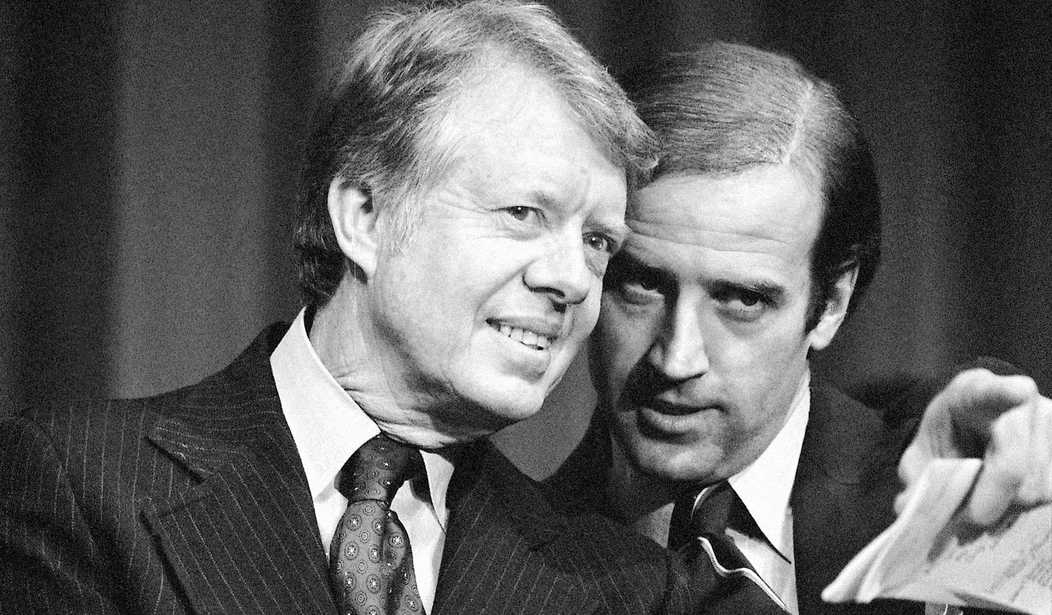The economy should be rebounding as the pandemic recedes and higher demand for goods and services from the newly lockdown-released leads to lower prices, which leads to even more spending. But — as anyone with two eyes, a bank account, and a need to eat can attest — that’s not what’s happening. In fact, consumer prices have hit a high not seen for 13 years.
And it’s no mystery why: the Biden administration, and Democrats in general, are spending the nation into what some conservative experts are insisting is lasting, structural inflation. Biden is claiming the high prices are only temporary.
Alfredo Ortiz, president and CEO of Job Creators Network, discussing Biden’s $1.2 trillion planned infrastructure spending on top of the already proposed $3.5 general spending plan, told members of the press Monday “that kind of spending is going to further erode the dollar and further [contribute] to our inflation woes.”
“Jimmy Carter 2.0 is here,” Ortiz said.
Which feels true in the immediate, but don’t expect Biden to take any responsibility for it. He’s already begun the process of passing the buck to the Federal Reserve.
He said as much Monday when making note of the “central bank’s independence,” knowing good and well that what the Fed can — and probably will — do to counter inflation is raise interest rates, further damaging small businesses that have suffered a year of lockdown and a disappointing reopening.
The Wall Street Journal editorial board did an admirable job of putting the lie to the notion that the Federal Reserve acts completely independently from political maneuvering:
In his remarks, Mr. Biden offered the ritual bow that the Federal Reserve is “independent.” But he ignored that someone has to finance Mr. Biden’s new entitlements, and the more Democrats spend, the harder it is politically for the Fed to raise interest rates because it costs the Treasury more to finance deficits. But if the Fed doesn’t raise rates soon enough, inflationary pressures can build.
Mr. Biden ought to be enjoying an economic boom from the ebbing pandemic as the government lockdowns end. Instead his policies have abetted a spike in inflation that is outstripping gains in wages. Telling people not to believe what they see with their own eyes is rarely a good political strategy.
In short, despite The Fed taking up the party line that the inflation is temporary and that they will work hard to keep interest rates low, they will — if things don’t stabilize — do what The Fed always does to counter inflation: raise interest rates. But for now, the central bank is adopting Biden’s narrative.
The Fed has said it will keep its benchmark short-term interest rate pegged near zero until it believes maximum employment has been reached and annual inflation moderately exceeds 2% for some time. The central bank’s policymakers have said they’re prepared to accept inflation above its target to make up for years of inflation below 2%.
Powell acknowledged Thursday that inflation is currently well above 2%, adding “of course we’re not comfortable with that.” But he noted that unemployment also remains elevated at 5.9%, and argued that the Fed doesn’t want to raise interest rates to counter what it sees as temporarily higher prices.
Economist Steven Moore, on the press call with Ortiz, was clear that because the spending the Biden administration is engaged in is not tied to any kind of economic success, it is not likely to lower prices.
“A lot of the spending is not tied to economic output…it doesn’t increase production, it just increases demand for services,” Moore said. “If the spending continues, there’s just no doubt…interest rates are going to rise.”
And when they do, watch the narrative from the administration shift to blaming The Fed.














Join the conversation as a VIP Member